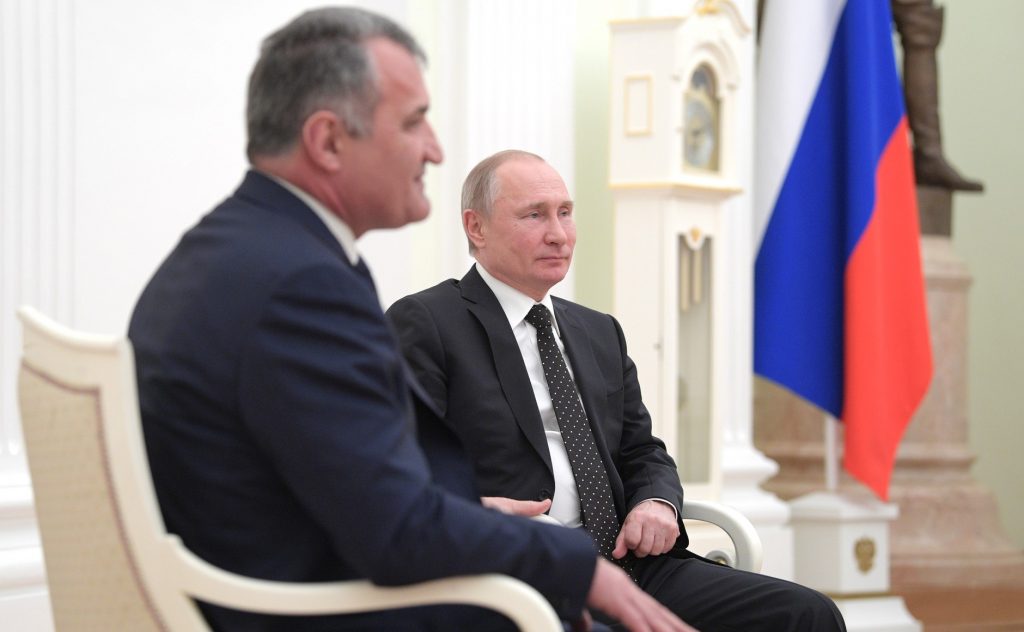In a lengthy interview published by RIA Novosti, Russian state-controlled media today, South Ossetian leader Anatoly Bibilov spoke of holding two referendums in the occupied region, first on annexation by Russia, and the second vote on joining North Ossetia.
“The direct accession to the Russian Federation and the immediate unification of Ossetia will not happen since the law does not allow it. But when S. Ossetia is part of the Russian Federation, then the processes of unification of Ossetia may proceed and there must be two referendums,” Bibilov said.
Bibilov noted that the first referendum will take place after April 10, the day when he hopes to get reelected. But he said the region’s ‘supreme court’ needs to greenlight the referendum first.
Asked whether the vote should take place after Russia ends its war in Ukraine, Bibilov responded that “it may be wrong to link a referendum to the special military operation [meaning invasion of Ukraine – Civil.ge].”
- Abkhaz Defense Chief Pledges ‘Military Assistance’ to Russia
- Sept 2021: Bibilov in Donbas – “We Fight for Russian World”
“But no matter what… a century-old desire to become part of the Russian Federation is real. We simply have no right to miss this opportunity.”
Responding to a journalist’s query how he sees his own role in the process afterwards, Bibilov responded: “as a military man, wherever my motherland tells me, that’s where I’ll go to serve.”
“Wherever I am offered, wherever I am told to be useful, that’s where I will work.”
Bibilov also asserted that in his opinion Russia will not refuse absorbing the occupied region, noting that Russia’s leading politicians understand very well that “the Ossetians are a divided nation.”
Possible ‘Provocations’ from Tbilisi
The Kremlin-backed leader said “there are concerns” that Tbilisi may carry out “provocations” to hinder Russia’s annexation of the region.
But, he noted, “we should be guided by the fears that exist in the future, and not those existing now.”
Bibilov claimed there may be “some kind of forceful actions” from Tbilisi, but maintained such scenario is hardly expected as Russia guarantees the security of the region.
He also said Russia will not be frightened by anything, “much less by Georgian sanctions, which are unlikely to seriously affect the Russian Federation.”
- More S. Ossetian Servicemen Sent to Ukraine
- 2008 War: ICC Files Arrest Warrant for S. Ossetian Officials
In his words, “adequate, proportionate measures will be taken” if the Georgian Government makesto any “provocations.”
“But once again I underline that at present we don’t see any threats from Georgia; the provocations that we have, we resolve in a diplomatic way, by raising these issues within the framework of the Geneva discussions.”
He claimed South Ossetia will be safer as a part of Russia than it is today as a subject of “international law.” (Only Russia and a handful of its client states recognize S. Ossetia’s independence – Civil.ge’s note).
He also said the Russian annexation will provide opportunities for economic and healthcare development, the development of education, sports, tourism.
On S. Ossetians Fighting in Donbass
Bibilov also spoke of South Ossetian volunteer fighters taking part in war against Ukraine in Donbas.
“Our citizens are participating not only today following the start of the special military operation, they have been participating since 2014.”
“Of course, volunteers came from South Ossetia, they are still here [in Donbas] today, of course, those Ossetians who serve in the Russian army, in its different units and subdivisions are also taking part,” noted Bibilov.
Some Background
Anatoly Bibilov announced on March 30 that his regime will take “appropriate legal steps in the near future” to ensure “unification” with Russia. He made similar annexation pledges multiple times before.
Some high-ranking Russian figures promptly welcomed the announcement. United Russia party’s Andrei Klimov said there will be “no legal obstacles” for S. Ossetia to join Russia after a referendum.
Georgia reacted that “it is unacceptable to discuss any referendums while Georgia’s territory is occupied by Russia.”
Moscow recognized the independence of Abkhazia and Tskhinvali Region on August 26, 2008, two weeks after the end of the Russo-Georgian war. Tbilisi and most of the international community regard the two regions as part of Georgia.
As things stand, some 30 thousand ethnic Georgians remain uprooted from Tskhinvali Region/South Ossetia following the armed conflict in 1991-92 and the Russo-Georgian War of 2008.
- U.S. Reacts to Russia’s Possible Annexation of S. Ossetia
- Kremlin on Possible S. Ossetia Annexation
- Russian Cheerleaders of Possible Annexation – List
This post is also available in: ქართული (Georgian) Русский (Russian)

